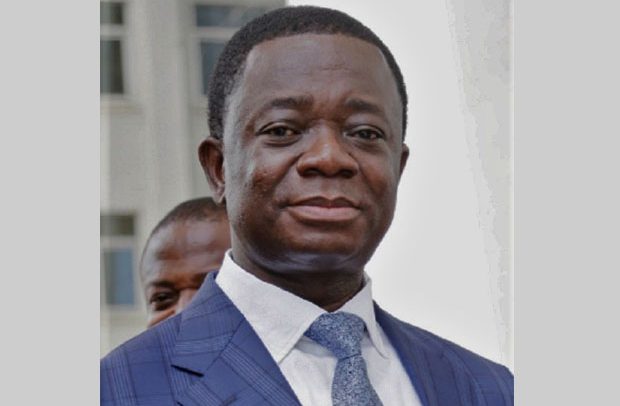Dr Stephen Opuni
The Supreme Court has in a narrow 3:2 decision, prohibited Justice Clemence Jackson Honyenuga, a Supreme Court judge sitting as an additional High Court judge, from further hearing the case of former Chief Executive Officer of Ghana Cocoa Board (COCOBOD), Dr. Stephen Opuni and businessman, Seidu Agongo.
Dr. Opuni alongside businessman, Seidu Agongo and the businessman’s Agricult Ghana Limited, are being tried for allegedly causing over GH¢217 million financial loss to the state.
Justices Gabriel Pwamang, Agnes Dordzie and Umoro Tanko Amadu said their colleague Justice Honyenuga cannot continue to sit on Dr. Opuni’s case whilst Justice Jones Victor M. Dotse who presided over a five-member panel and Justice Lovelace Johnson, held that Justice Honyenuga could continue to sit on the case.
Net Effect
The net effect is that once the majority carried the vote, Justice Honyenuga cannot sit on Dr. Opuni’s case unless the Attorney General’s (AG) Department decides to overturn the decision through a review, where the panel would be increased to seven or more.
The AG’s Department, according to DAILY GUIDE sources, is studying the court’s decision to see their next line of action.
Legal experts have told DAILY GUIDE that if the AG’s Department is not able to overturn the decision, a new judge will be appointed and the judge would evaluate the evidence adduced up to the submission of no case stage and continue from there without restarting the case from scratch.
Opuni had filed a motion before the court seeking it to quash parts of Justice Honyenuga’s ruling on his application for a submission of no case, as well as prohibit the judge from further hearing the case on ground of ‘bias’.
The Supreme Court panel subsequently quashed portions of the trial judge’s ruling on the submission of no case which rejected certain documents tendered by lawyers of the accused persons through some prosecution witnesses when the trial court was asking the accused person turned appellant to open his defence.
The court said the reasons for its decision would be available at the registry on July 30, 2021.
Main Case
Dr. Opuni together with Seidu Agongo, and Agricult Ghana Limited, were ordered by the trial judge on May 7, 2021, to open his defence respectively, after the prosecution had closed its case.
The ex-COCOBOD boss then filed multiple applications before the court, including a stay of proceedings, one of which was filed at the Court of Appeal and was dismissed.
He had earlier filed an application before the court asking Justice Honyenuga to recuse himself from the trial, and that application was also dismissed by the trial court, which held that it was brought in bad faith.
He also petitioned the Chief Justice (CJ) to get the trial judge to recuse himself from the trial, but the petition was dismissed by the CJ, who stated that the petition did not disclose any likelihood of bias on the part of the judge.
SC Move
Dr. Opuni then went to the Supreme Court asking the court to exercise its supervisory power to quash parts of the decision of Justice Honyenuga to exclude some exhibits in his ruling on a submission of no case filed by the accused persons.
He also asked the court to prohibit Justice Honyenuga from further hearing the case.
Moving the motion, Samuel Codjoe, counsel for Dr. Opuni, insisted that the trial judge’s decision breached Section 6 of the Evidence Act which states that objections to evidence must be made at the time of tendering, not in a ruling on submission of no case.
He said the decision constituted a breach of natural justice as it did not give the accused person the opportunity to be heard when it sought to reject those documents.
Mr. Codjoe further stated that the trial judge acted contrary to Section 8 of the Evidence Act, adding that Dr. Opuni not being given the opportunity to be heard, is a breach of constitutional requirement.
On the allegation of bias, counsel had stated that the trial judge admitted one statement of a farmer which was against Dr. Opuni, but rejected another one by a farmer which was in favour of the accused person.
He added that the trial judge made final findings in his ruling on the submission of no case when he has not heard the accused person.
Prosecution’s Opposition
The motion was opposed by Deputy Attorney General, Alfred Tuah-Yeboah, who argued that Dr. Opuni’s application failed to meet the required threshold when it comes to the invocation of the Supreme Court’s supervisory jurisdiction.
He said Dr. Opuni had argued that there was an error on the face of the record, but failed to demonstrate that if there is such an error, it was so fundamental to the extent that it goes to the root of the impugned ruling.
He said the trial judge was therefore, right in his conclusion that a case has been made for which Dr. Opuni should open his defence, adding that “he never committed any error that went to the root of the matter.”
On the allegation of bias, Mr. Tuah-Yeboah had further argued that there was no proof that there is actual bias or real likelihood of bias.
He added that the trial judge never pronounced on the guilt of the accused person, but only said that the ingredients of the offence have been proved for which the accused person should be called upon to open his defence and therefore, prayed the court to dismiss the application.
BY Gibril Abdul Razak

